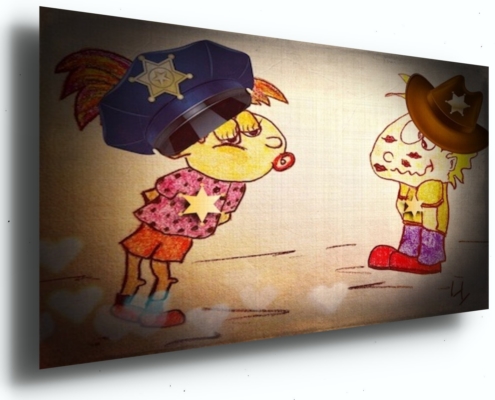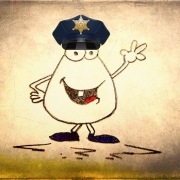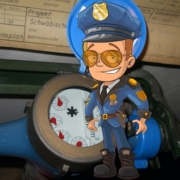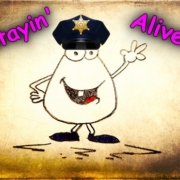Don’t Pet the Peeve: 8 Facts About Police Detectives You’re Probably Not Getting Right
Have you ever wondered what real-life investigators think about your detective characters? Well…
1. On their days off, fictional detectives enjoy … wait, those guys never have any down time. None. I remember working a murder case where I left home one morning at the normal time and didn’t return until 36 hours later. When the trail is hot you have to follow it.
In the real world, the one on the outside of your book covers, all cops have regularly scheduled days off. Sure, they’re sometimes forced to work during their weekends, especially when emergency situations arise, but not for 300 straight pages days.
2. Make-believe investigators are suspended from duty at least once per story, yet they continue to work their cases. Is there a writer anywhere in this world who truly understands the definition of suspension? I’m kidding, of course. However, just in case … Suspension: to force someone to leave their job temporarily as a form of punishment. A police officer may not carry out/perform the duties of a police officer while on suspension.
The punishment (suspension) is typically ordered because the detective did something severely wrong, which, by the way, is a rare occurrence. Therefore, continuing to work a case while suspended certainly will not win him/her any favors with the higher-ups. In fact, to do so is the equivalent of disobeying a direct order, a cause for termination.
3. Imaginary detectives and pretend bad guys have the remarkable ability to render someone unconscious by striking them on the back of the head with any handy object, such as books, candlesticks, sticks, rocks, heel of the hand, fists, pillows, marshmallows, feathers, and/or guns of any type.
Writers, writers, writers (I’m slowly shaking my head from side to side), it’s time to come up with a new tactic, because this one is old, stale, and dusty. Besides, a “hit to the back of the head” rarely works in real life. I’ve seen people, me included, struck with baseball bats and they never lost consciousness. And, to add insult to injury (pun intended), the blow often does no more than to make those folks as mad as wet hens (whatever that means). If the whack is hard enough to get the job done the injury it caused would truly be a serious one. Therefore your hero won’t be popping back up right away to handcuff anyone. Instead, a visit to the hospital would be in order.
4.  Marriage is practically taboo in crime fiction. Rarely do fictional law enforcement officers enjoy the company of spouses or serious relationships. Yes, some are haunted by the tormented spirits of dead husbands or wives, but not living, breathing people. I suppose it’s easier to write a tale about a person who’s single, but cops in the real world do indeed marry, and some do so four or five times since the job truly can wreak havoc on married life. For the most part, though, family life is important.
Marriage is practically taboo in crime fiction. Rarely do fictional law enforcement officers enjoy the company of spouses or serious relationships. Yes, some are haunted by the tormented spirits of dead husbands or wives, but not living, breathing people. I suppose it’s easier to write a tale about a person who’s single, but cops in the real world do indeed marry, and some do so four or five times since the job truly can wreak havoc on married life. For the most part, though, family life is important.
5. Pretend cops are the straightest shootin’ folks on the planet. They’re so good, in fact, that they’re able to use their sidearms to part the hair on a gnat’s far left hind leg from a distance of a hundred yards, or more.
The embarrassing reality, however, is that many cops barely shoot well enough to earn a qualifying score on the range. And the business of shooting a gun or knife from the hands of bad guys? Forget it. Doesn’t happen. Not today and not tomorrow. Even if the officer could hit such a small target, especially while it’s moving, it’s not what they’re trained to do, which is to shoot center mass.
6. A popular theme in Fictionland is to have a detective going off on his own to do something that’s totally against the orders of the chief or sheriff. In reality? Nope. To do disobey the orders of a chief or sheriff (especially a sheriff), well, the detective would quickly find himself filling out job applications for a new line of work. Simply put, cops follow the orders of their superiors. If not, they’re destined to soon become carpenters, cab drivers, appliance or auto salespeople, etc.
7. After a quick look at the body of a murder victim the pretend gumshoe is often able to determine the caliber of bullet that ended the poor guy’s life. No. It is not possible to know the bullet size based on a glance at a wound. Many factors could affect the wound size and shape—angle of impact, velocity, etc. Even when spent casings are found nearby it’s still not safe to assume those were the rounds that killed the victim. A really good guess, yes. Without a doubt, no.
8. Fictional detective I. M. Thebest decides to change jobs and he sees a job opening listed in the local paper. So he makes an appointment to have drinks with the chief of police in a city 300 miles away, where the action is greater and the liquor is cheaper, to discuss the opportunity. The two agree on the move and Det. Thebest is immediately scheduled to start work as top detective in the new city. Two weeks later he begins his new career and fits in perfectly. Magically, he knows the area and all the usual suspects and their hangouts, and the detectives who’ve worked in the department for 20 years all welcome him with open arms.
Stop. This is just too silly. No, this sort of thing does not happen in the real world. As a rule, detectives do not transfer as detectives to another department, especially as the head investigator in charge. Instead, if, for some reason they elect to switch departments they’d typically need to start over again as patrol officers. And, in most places they’d need to attend at least some training, including a brief field training program, before hitting the streets. To vary from this would be unfair to the officers who’ve paid their dues and have been waiting for the promotion or move to the detective division.
 There you go, eight pet peeves of many cops who
There you go, eight pet peeves of many cops who read used to read your books. Remember, though, you’re writing fiction and that means you can make up all kinds of cool stuff. However, when deviating from the reality of police work and the real world, it’s a must that you give the reader a proper reason to suspend what they know is the truth. This is especially so if you want cops to enjoy your work along with your other fans.
So, if you want your make-believe specially-skilled detective to transfer from one department to another as their chief of detectives, then a quick meeting of city council to approve the move would be all that’s needed to make it so. See how easy it is? Still, the other officers and detectives wouldn’t approve. Not at all.
Oh yeah … NO cordite, unless you’re writing historical fiction.














I’m currently reading a book and having a great deal of trouble accepting that the detective in question wouldn’t have been sent packing for her blatant flaunting of procedure, disobeying orders, etc. What’s really troublesome is the book was written by a police officer.
Thank you! I am always annoyed by anyone who looks at a wound and declares, “Nine Millimeter,” especially since 9mm, .38, and .380 are all the same diameter.
They do break the rules, but when they do they provide a solid means to allow viewers to veer from reality. Even when the means is a bit silly, it’s sort of believable in a weird sort of way, because, well, it’s Monk.
I know it’s a silly series, but for some reason now that it’s years after first on, I’ve gotten hooked on Monk. Fun to watch, though I know they break a lot of the rules!